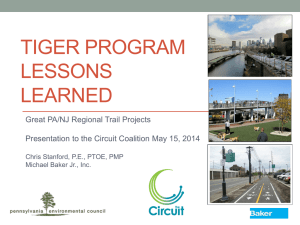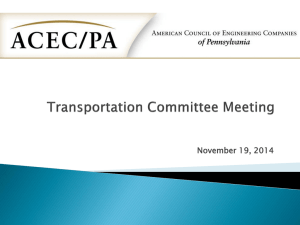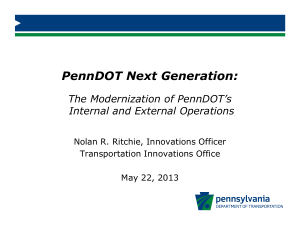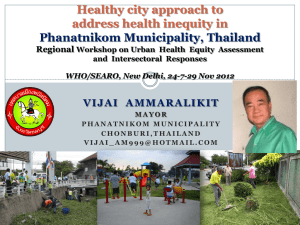RFP/RFQ - ACEC/PA
advertisement
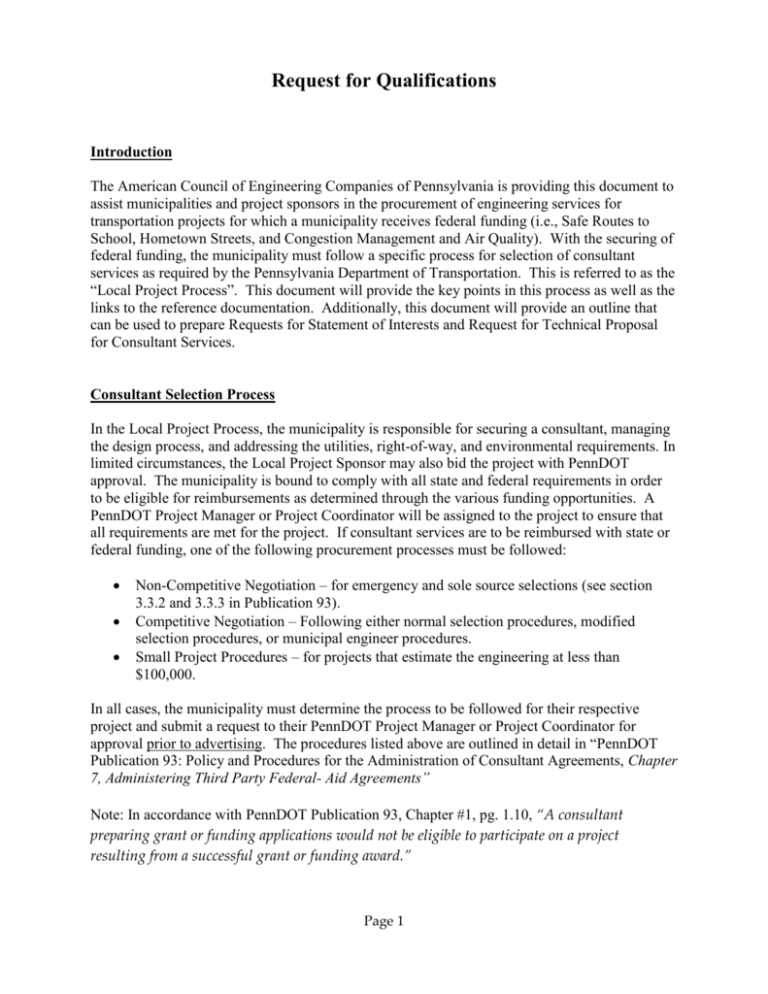
Request for Qualifications Introduction The American Council of Engineering Companies of Pennsylvania is providing this document to assist municipalities and project sponsors in the procurement of engineering services for transportation projects for which a municipality receives federal funding (i.e., Safe Routes to School, Hometown Streets, and Congestion Management and Air Quality). With the securing of federal funding, the municipality must follow a specific process for selection of consultant services as required by the Pennsylvania Department of Transportation. This is referred to as the “Local Project Process”. This document will provide the key points in this process as well as the links to the reference documentation. Additionally, this document will provide an outline that can be used to prepare Requests for Statement of Interests and Request for Technical Proposal for Consultant Services. Consultant Selection Process In the Local Project Process, the municipality is responsible for securing a consultant, managing the design process, and addressing the utilities, right-of-way, and environmental requirements. In limited circumstances, the Local Project Sponsor may also bid the project with PennDOT approval. The municipality is bound to comply with all state and federal requirements in order to be eligible for reimbursements as determined through the various funding opportunities. A PennDOT Project Manager or Project Coordinator will be assigned to the project to ensure that all requirements are met for the project. If consultant services are to be reimbursed with state or federal funding, one of the following procurement processes must be followed: Non-Competitive Negotiation – for emergency and sole source selections (see section 3.3.2 and 3.3.3 in Publication 93). Competitive Negotiation – Following either normal selection procedures, modified selection procedures, or municipal engineer procedures. Small Project Procedures – for projects that estimate the engineering at less than $100,000. In all cases, the municipality must determine the process to be followed for their respective project and submit a request to their PennDOT Project Manager or Project Coordinator for approval prior to advertising. The procedures listed above are outlined in detail in “PennDOT Publication 93: Policy and Procedures for the Administration of Consultant Agreements, Chapter 7, Administering Third Party Federal- Aid Agreements” Note: In accordance with PennDOT Publication 93, Chapter #1, pg. 1.10, “A consultant preparing grant or funding applications would not be eligible to participate on a project resulting from a successful grant or funding award.” Page 1 Request for Qualifications The majority of projects will follow the Competitive Negotiation Process. As outlined in PennDOT Publication 93, this process is a Qualification based Selection Method. Final price proposals are submitted upon selection of consultant to be used in the negotiation of a contract. The Normal Selection Process can be used on all projects but is required on projects in which the engineering services and potential supplements are anticipated to exceed $100,000. The process is as follows: 1. 2. 3. 4. 5. 6. 7. 8. Municipality advertises for Statements of Interest Municipality short lists three consultants Three consultants submit Technical Proposals Municipality selects final consultant PennDOT approves selection Consultant submits Price Proposal Negotiation on Price Proposal* Legal Agreement with PennDOT prepared *If the municipality cannot come to terms on the price or schedule, then the next qualified consultant may be selected. The Modified Selection Process is applicable to construction inspection services, bridge inspection services, and non-complex or select moderately complex projects. Definitions of noncomplex and moderately complex projects are contained in PennDOT Publication 10 (Design Manual 1), Chapter 2. The process is as follows: 1. 2. 3. 4. 5. 6. Municipality advertises for Statements of Interest Municipality selects final consultant PennDOT approves selection Consultant submits Technical and Price Proposal Negotiation on Price Proposal* Legal Agreement with PennDOT prepared *If the municipality cannot come to terms on the price or schedule, then the next qualified consultant may be selected. In order to utilize a Municipal Engineer for consultant engineering services, the municipal engineer must have been selected utilizing either the Normal or Modified Selection Processes. The small project procedure is only applicable to projects were the engineering costs are expected to be less than $100,000, including potential supplements. The procedure requires the municipality to solicit qualifications from three (3) qualified consultants. A public advertising period is not required. The municipality will select a consultant from the qualifications submitted. The consultant will prepare a technical and price proposal for preparation of a legal agreement with PennDOT. Page 2 Request for Qualifications Scope of Work In order to provide a competitive selection process, a detailed scope of work should be prepared by the municipality. The scope of work should identify the anticipated infrastructure improvements as well as the anticipated services to be required of the consultant. For example the scope of work should include the following information: Limits of proposed infrastructure improvements Anticipated Infrastructure Improvements o Roadway improvements o Traffic Signal improvements – identify equipment upgrades o Streetscape Improvements – identify elements to be included in project (i.e., lighting, landscaping, traffic calming, etc) Adjacent Projects that may affect improvements Required DBE percentage, if applicable. Available Existing Data Required Consultant Services (i.e, topographic survey, right-of-way acquisition, public meeting attendance, lighting design, etc.) Services to be provided by municipality A separate scope of work and contract is typically prepared for construction inspection services, if required by the agreement with PennDOT. Advertisement Upon approval of the selection process and development of a scope of work, the municipality will publically advertise the solicitation for qualifications. In addition to placing the ads in local newspapers, the municipality may forward their advertisement information in hard or electronic form to: American Council of Engineering Companies of PA 800 North Third Street, Suite 301 Harrisburg, Pennsylvania 17102 http://www.acecpa.org/ Statement of Interest As per the aforementioned Consultant Selection Process, the first step is for consultants to submit a Statement of Interest (SOI). A Statement of Interest should be succinct and is typically limited to 3 to 7 pages excluding the supportive documents. The RFQ for a Statement of Interest should request the following information from the consultant team: Page 3 Request for Qualifications Identify related project experience on projects similar in scope and size to the municipality’s project or specialty experience required for this project. Identify the project team, including subconsultant and their roles in the project. Address ability to meet the DBE requirements, if applicable. Identify the Primary contact and supporting staff on the project. Identify the consultant’s understanding of the project and how the consultant plans to address the project needs, including cost effective approaches and ability to meet time schedule. Provide supporting documentation, including o SF 330 Forms, with resumes and references o PennDOT Business Partner Information o Organization Chart o DBE certifications o Municipality specific requirements (i.e., insurance, etc.) Technical Proposal The Technical proposal provides the basis for the final consultant selection in addition to setting the groundwork for the price proposal. As such, it is important to identify the tasks the will be required to complete the project within the requirements under the state and/or federal funding as well as follow PennDOT’s Engineering and Construction Management System. Below is a breakdown of typical tasks that may be expected for a project. Phase 1 – Alternatives Analysis Often the project funding is not sufficient to cover all of the improvements on the municipality’s wish list. If necessary, the first phase of the project would be an alternatives analysis to determine the improvements that can be completed within the allotted funding. Below are some tasks that can be completed during this Phase: Topographic Survey, including Right-of-Way determination Scoping Field View Traffic Analysis, if necessary Concept Preparation and Cost Estimate Consensus Building Phase 2 – Preliminary Engineering In accordance with PennDOT procedures, the preliminary engineering phase covers the tasks necessary to obtain Design Field View Approval from PennDOT. Below are some tasks that can be completed during this Phase: Topographic Survey, if not completed in Phase 1 Traffic Analysis, if not completed in Phase 1 Environmental Clearance (CEE), including public meeting Safety Review Approval Page 4 Request for Qualifications Utility Coordination Preliminary Right-of-Way Plan preparation Erosion and Sediment Control measures and Stormwater Management Design Field View Approval Phase 3 – Final Design This phase consists of addressing the preliminary engineering comments, obtaining final approvals, and inputting data in ECMS for bidding. Below are some tasks that can be completed during this Phase: Final Roadway Design Final Traffic Signal Design Final Signing & Pavement Marking Plan Final Traffic Control Design Final Right-of-Way Plan Final Erosion and Sedimentation Plan Final Structure Design Final Lighting Design Final Utility Clearance Plans, Specifications, and Estimate (P, S, & E) Activities Inputting in ECMS Phase 4 – Services during Construction During construction, it is often necessary for the design engineer to provide clarification or address unforeseen items. Below are some tasks that can be completed during this Phase: Plan Interpretation\Resolution Shop Drawing Review Attendance at Construction meetings Page 5 Request for Qualifications Reference Material PennDOT Publication 93: Policy and Procedures for the Administration of Consultant Agreements, Chapter 7, Administering Third Party Federal- Aid Agreements PennDOT Publication 535: Overview of PennDOT Local Project Processes: A Guide to Getting Started on a Local Project with PennDOT American Council of Engineering Companies: Qualifications Based Selection Process Page 6


